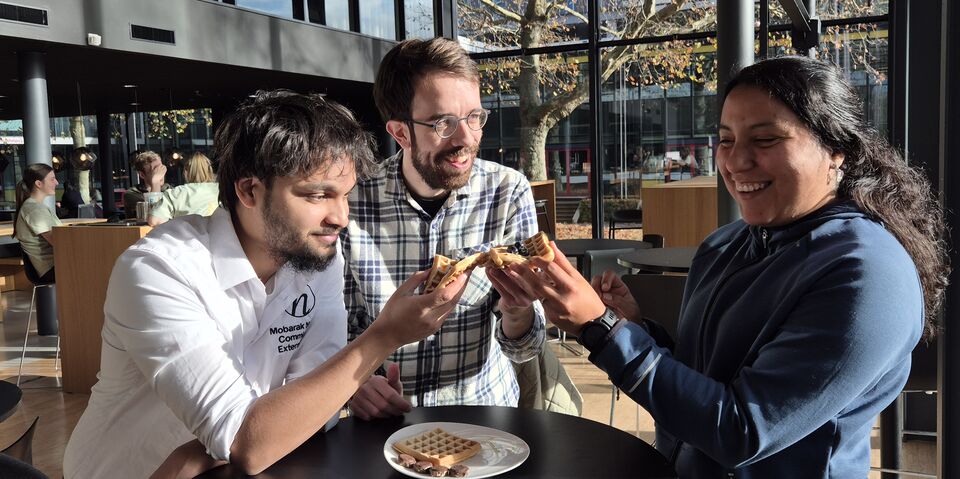Waffles without eggs or milk to make TU/e fully plant-based
How do you convince students to sign your petition for a fully plant-based catering service? By letting them taste how good it can be. On Thursday afternoon, the still-small group Plant Based Universities Eindhoven will hand out warm, homemade vegan waffles.
At the Markthal, initiators Thijs Jenneskens (PhD candidate at Electrical Engineering), Alfaima Solano (PhD candidate at Industrial Engineering), and Fontys student Mobarak Nathoe will be making fresh waffles together with other members of Plant Based Universities Eindhoven. Their recipe includes applesauce, which reacts with the baking soda to make the batter rise—meaning no eggs are needed for a fluffy waffle. They also opt for a plant-based alternative to milk. Toppings include plant-based whipped cream, sprinkles, caramel sauce, blueberries, and powdered sugar. But more importantly, they hope to draw attention to their petition.
“By signing our petition, you’re supporting the idea that catering options at TU/e and Fontys should become one hundred percent plant-based,” says Jenneskens. This year, he attended a summer school organized by the European movement Plant Based Universities in Germany and was impressed by the dedication of the student organizers. “I took workshops on nonviolent resistance and negotiation techniques—very useful for campaigning. The day after I got home, I put up twenty posters to find supporters.” There’s now a group of thirteen students and PhD candidates committed to promoting plant-based catering at educational institutions in Eindhoven.
Easier
The three emphasize they’re not saying everyone has to become vegan; their aim is to raise environmental awareness. “The meat industry has a major negative impact on the climate,” Jenneskens argues. “Research shows that forty percent of tropical deforestation is replaced by grassland and grain fields to feed cows and chickens, which are then used to feed people.”
Switching cafeterias at large educational institutions to fully plant-based options makes things easier for people who feel that their individual actions can’t contribute much to solving the problem. “You no longer have to ask yourself—every time you want to buy a sandwich or a cup of soup—whether you’re going to make an environmentally friendly choice today. That choice has already been made.”
“Food is also the easiest way to make a positive impact,” Solano adds. She grew up in Colombia, where meat and cheese are used extensively. “I’m amazed by what you can do with vegetables and how good it tastes. As a bonus, it feels good knowing it’s better for the environment.”
Cheaper
There are many additional benefits to plant-based food. “It’s inclusive for the whole community because it’s both halal and kosher. And it’s affordable. We’re convinced that meals could become cheaper this way. Meat substitutes cost about the same as meat, but legumes and vegetables don’t. And here’s a tip: for any dish that traditionally uses ground meat, you can substitute lentils instead.”
Handing out waffles is the group’s first action. “We’re already in discussion with the Go Green Office and the vegan student association VSA, which means we support and promote each other,” says Nathoe. He notes that some other educational institutions are already further along than those in Eindhoven. “In Amsterdam, universities and universities of applied sciences already have ‘Nieuwe mensa’ initiatives offering affordable, fully plant-based meals. Eindhoven should be able to do that too.”
This article was translated using AI-assisted tools and reviewed by an editor.


Discussion